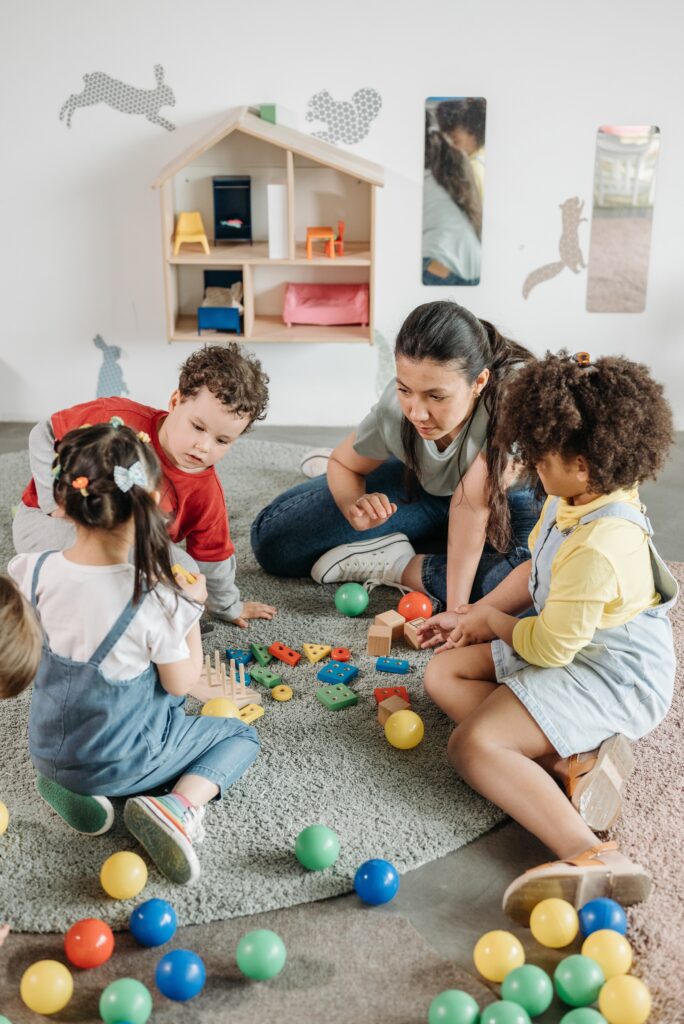Is it time to send your little one off to daycare or find a new childcare center after a negative experience? Use a little caution when looking for the right place for your child. Watch out for signs of problems and listen to your gut.
Below are seven warning signs for childcare centers to help you narrow your list of options.
1. Boring Environment
Children of childcare ages need stimulation. This is how they learn. Without this interaction daily, they can experience stunted mental and emotional development. When checking out a daycare center, look for plenty of popular toys and play options. Talk to the center about how they encourage mental stimulation. Also, ask about how often toys are cleaned and replaced.
2. Poor Emotional Connection
Caregivers must supply kids with love and attention when parents are not present to provide it. Do other children in the facility appear well-attended and cared for? Are there many crying children being left in areas alone? Do the teachers know how to redirect children after misbehaviour? Remember, a childcare center should educate, stimulate and appropriately discipline, not punish.
3. Overcrowding
To a childcare center, you and your child are an essential part of their profitability. But some centers go overboard in trying to serve too many families at once. What is the child-caregiver ratio of your prospective center? Are children running amok?
4. Unhealthy and Unsafe
If you hear a lot of coughing and sniffling during your childcare center visit, your child risks getting sick. In reality, children should stay home when they run a fever or feel ill. Talk to the center about their sick child policy. Ask about what to do if your child is feeling unwell and how the center responds to sick kids. Also, inquire about toilet training and what happens if your little one has a toilet accident.
As far as safety goes, no one can underestimate the importance of a safe child care center environment. Ask about their safety procedures and look for signs of problems when you visit the center. Are the staff changing diapers while wearing gloves? Do you see them washing their hands after diaper changes? Do you smell cigarette smoke on the providers? Does the center have safety bars, if it is housed in a multi-story unit?
5. Poor Activities
Your child needs mental, physical, emotional and social growth. Without these types of educational advancement, they feel under-stimulated. Children should be encouraged to interact and participate in group activities. Ask about activities offered at the center and outdoor play. Also, look for stimulating materials like books and building blocks. Does the center ever take kids on field trips or outings?
6. Regional Licensure
Licensing is critical for any childcare center. Do they have the appropriate licenses and certifications required where you live? These laws vary from one geography to the next. Do your research and ensure your potential childcare center adheres to legal requirements. Also, conduct an online search for reviews and to find any information about complaints filed about the center.
7. Poor Communication
Is the director of the center actively involved in communication with you? Are you able to easily get through to the staff and schedule a visit or appointment? If the discussion seems poor from the start, things typically will only get more complicated from here. Also, find out if you are allowed to drop by unannounced. If that is not permitted, it could indicate a real problem.
What Are the Functions of Daycare?
Many parents leave their children in daycare centers while they work. While some parents believe that a professional daycare center is the safest option for babysitting, a daycare center has a variety of benefits and functions. Children who attend daycare centers benefit from a variety of social and educational opportunities provided by the center. If you enjoy working with children, daycare centers can be a profitable small business.
Safety
A daycare center’s primary function is to provide a safe and secure environment with quality caregivers so that parents can have peace of mind knowing their children are safe while they work. Each state has regulations in place that require compliance with established safety practices, which you should consider before deciding on a location for your daycare center. Many states have departments dedicated to childcare licensing that conduct regular routine inspections of daycare facilities as well as respond to complaints. Even in-home daycare providers must comply with safety and licensing regulations in these states.
Education
Most daycare centers have educational activities planned for infants through preschool-aged children that help build a foundation for future academic success. Children learn through both play and structured learning programs. Most preschool-aged children can recognize and write letters and sight words, as well as perform basic addition and subtraction. This eases the transition to kindergarten and provides them with a head start on learning skills.
Unless you offer a pre-kindergarten program, a good mix of reading, counting, art, and writing will provide the children in your care with the educational opportunities they require. Larger daycare centers typically follow a set schedule and operate similarly to a traditional school.
Socialization
One of the most important advantages of a child attending a daycare program is socialization. Children learn valuable social skills such as sharing, compromising, and language skills through play with peers and interactions with adult staff members. Children who do not have access to peer groups have a more difficult time adjusting to elementary school than those who attend daycare or preschool. Consider toy kitchens and costume pieces for dressing up as play equipment that allows for role exploration.
Health
Daycare facilities must provide nutritious, well-balanced meals and snacks. Most states have laws governing the types of foods and beverages that can be served to children in daycare. Daycare centers are also responsible for ensuring that children get enough physical activity. These objectives are typically met through a combination of song and dance, outdoor play, and structured activities. Check with your state’s licensing department to see if there are any programs that can assist you in ensuring that your daycare meets the nutritional requirements. Some states have programs that help offset the cost of healthy food, drinks, and snacks if you serve a low-income area.
8 Benefits of Daycare for Children
The development of numerous talents in young children can be encouraged in a well-supervised daycare environment. Here are some of the benefits of using a daycare.
1. Regular Schedules and Routines
Although young children may not understand the concept of time, they can learn about routines and schedules in a daycare setting. A daycare is a place where children are exposed to a variety of fun and educational activities such as singing and storytelling. These activities are especially important for toddlers’ intellectual growth and development. Structured times for playing, eating, and napping help shape a toddler’s behavior, which may benefit parents at home.
2. Academic Advancement
Kids who attended high-quality daycare as young children performed better cognitively as teenagers. Sending your children to daycare can help them succeed in the future. This is true for daycare settings with adequate support and numerous opportunities for extensive interaction with caregivers and peers.
3. Increased Confidence
Daycare teaches your child to be confident and at ease in social situations. This will come in handy throughout their lives, especially when meeting new people. Children can practice communication skills and build their self-esteem by learning important interpersonal skills at a young age.
4. Communication
Your child can develop effective communication skills in a childcare setting because there are kids there of all ages and developmental stages. Some children are talkative and chatty, while others prefer to communicate nonverbally. Regardless of the communication patterns, it is an excellent opportunity for your child to work on the areas of communication in which they are struggling.
5. Time For Fun and Socialization
Children require a significant amount of time to play and socialize. Daycare may also be useful for parents who do not have time to arrange playdates for their children. Children are not only given opportunities to play games and have fun at a daycare. They can also make friends who will stick with them throughout their school years. The socialization building blocks shape young children’s early days of learning, which take place in a safe and supervised daycare setting.
6. Smoother Transition Into Kindergarten
Children who attend a good daycare center have an easier time adjusting to the structured environment of kindergarten. Teachers and caregivers in daycare centers introduce the fundamental concepts of alphabets and numbers through play and other engaging activities. This will assist your child in adjusting to formal schooling.
7. Independence
Children who attend a quality daycare from an early age gain independence. Daycare children must get used to the fact that they won’t have their parents or any other adult family members with them. They will only be able to rely on themselves and their professors. Kids will be given easy assignments and exercises to build independence, such putting their socks on and tidying their toys.
8. Better Behavior
A daycare gives children the opportunity to play and socialize with other children their age. Working with others teaches them how to behave better and how to be team players. They learn how to share, play, and learn well together as their personalities and minds develop.



